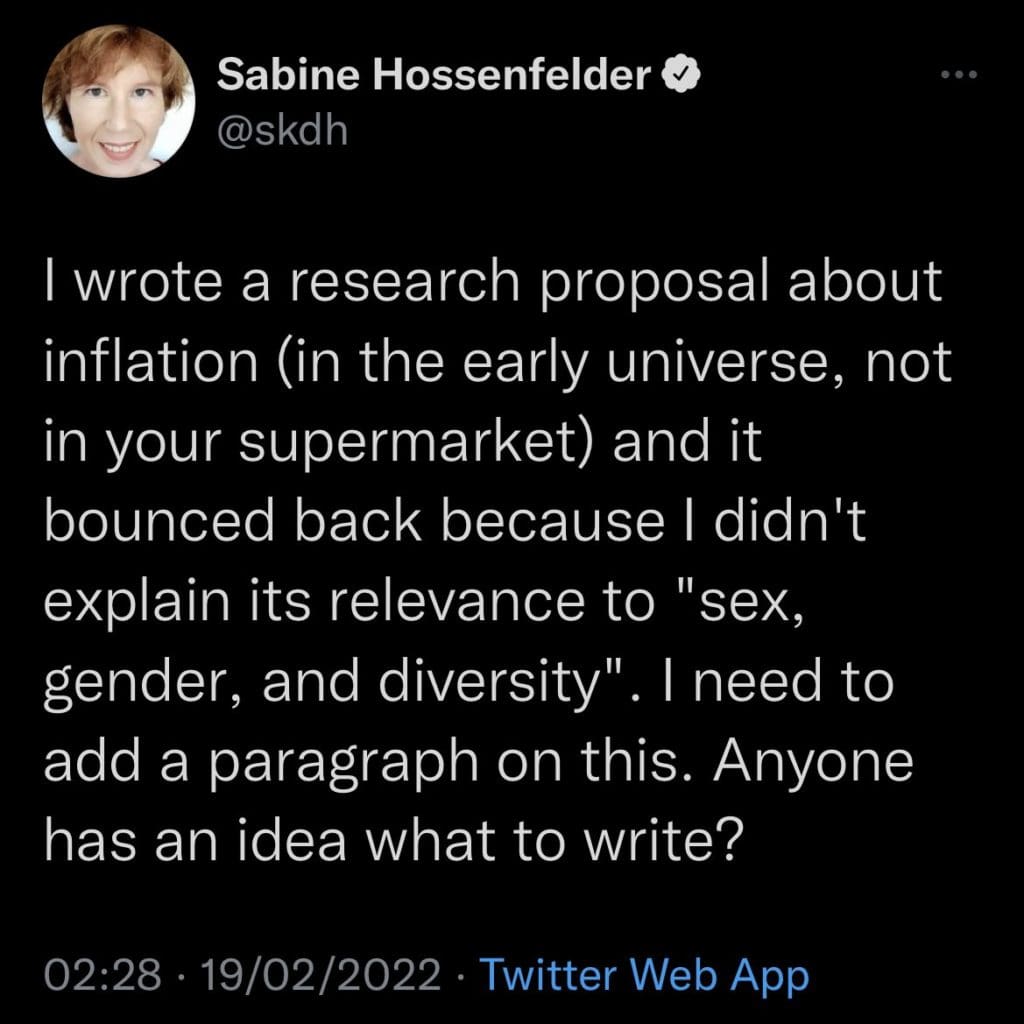Acclaimed German quantum physicist Sabine Hossenfelder had her research proposal on cosmic inflation returned to her because the subject did not address its “relevance to sex, gender, and diversity,” with her case revealing that even in the hardest of sciences there is no escaping ideological purity tests.
Hossenfelder, who leads the Superfluid Dark Matter group at the Frankfurt Institute of Advanced Studies, wrote about the issue of her initial rejection on Twitter, saying that she was looking for advice on how to address the problem.

Questions arose as to why Hossenfelder needed to include information on sex and diversity for a research paper on the early universe, which led to a heated debate in the comments section of her post. She then reacted by deleting her tweet, issuing an explanation why she removed the post.
There is no reason to believe Hossenfelder was critical in her initial tweet, and she may have earnestly been looking for advice on how to address the gender and diversity requirement. Nevertheless, her tweet reveals the current state of academia. Even if she personally harbored any skepticism about such criteria, she has a strong incentive to keep quiet about it, as there are clear career and reputational consequences for any professor who openly questions the need for addressing diversity and gender in areas such as the hard sciences, even for seemingly completely unrelated topics like cosmic inflation.
“If I want to focus on merit, fairness and equality, then you get called out as a racist or sexist”
Her tweet is hardly unique, with nearly every facet of academia increasingly focused on the issue of diversity, gender and inclusion. For researchers, scientists and professors who want to conduct their work in peace, there is little chance of entirely escaping such ideologically-fraught topics. For the few that reject or even voice mild criticism of this development, they are ostracized and sometimes outright resign out of frustration.
Grants, which are the lifeblood of academic research, are increasingly issued in Western universities based on an ideological litmus test. Take for example the case of award-winning Canadian scientist Prof. Patanjali Kambhampati, who says he has been denied grants because he refuses to hire based on skin color and instead only focuses on merit.
“We will hire the most qualified people based upon their skills and mutual interests,” Kambhampati wrote on his initial grant application, which was later rejected.
“I’ve had two people say that was the kiss of death,” said Kambhampati, who works in McGill University’s chemistry department. “I thought I was trying to be nice saying that if you were interested and able I’d hire you and that’s all that mattered. I don’t care about the color of your skin. I’m interested in hiring someone who wants to work on the project and is good at it.”
“If I want to focus on merit, fairness and equality, then you get called out as a racist or sexist,” the Canadian with Indian roots said.
[pp id=16158]
Kambhampati initially refused to go public when his first grant was rejected. However, he said the government’s push for equity, diversity and inclusion (EDI) provisions, as well as what he describes as woke culture, are “killing innovation, harming science and disrupting society.”
“I believe this is an important stand to make. I will not be silenced anymore,” he said.
Universities are increasingly staffed with “diversity experts” and czars who police these issues, essentially creating a bureaucracy that increasingly needs to find ways to justify its existence. In fact, diversity training has become a billion-dollar industry, with one MIT professor estimating that businesses were spending $8 billion a year to increase diversity all the way back in 2003. As Time magazine wrote, it’s a business and business is booming:
“The lucrative industry shows few signs of waning–from the spike in well-compensated diversity consultants and czars; to online courses and degree programs at prestigious schools; to professional organizations and conferences; to the commissioning of ever more studies, task forces and climate surveys. The buzzword is emblazoned on blogs and books and boot camps, and Thomson Reuters, a multinational mass-media and information firm, even created a Diversity and Inclusion Index to assess the practices of more than 5,000 publicly traded companies globally.”
Universities are also invested in this business, and for those who make their livelihood around these issues, the work is “never done.”
In the case of Hossenfelder, the fact that she herself is a woman in a field dominated by men should theoretically be seen as a victory in itself for those who want more diversity in physics and hard sciences, which are still overwhelmingly dominated by men. However, for the gatekeepers who control funding and grants, progressive ideology in areas such as gender and race come before all else, regardless of the topic or the person requesting that funding is.
[pp id=29538]
Grants are not just vital to academics but a whole range of professionals and creatives as well. Just last month, it was revealed that the MOIN Film Fund based in Germany, which disburses millions in taxpayer euros to fund film projects, requires all applicants to fill out a “diversity checklist” to receive money for their projects. The checklist not only requires applicants to indicate whether “people of color” are on a film team, but also whether the film addresses the issues of gender, LGBT, or race.
In other words, for those who want to advance their career or secure funding, the message is that they better be on board.
From California to Germany, race and gender dominate
The evidence of a widespread and ideologically-motivated obsession with the gender and race in the university system is apparent across the Western world.
In the U.K., there is an effort to “decolonize the curriculum,” where professors are now advised not to give more weight to grammar and spelling than is necessary, as it is allegedly an elitist, White, and masculine form of expression. The country’s universities have also implemented mandatory classes on race and gender. At the University of Sussex, Professor Kathleen Stock was harassed out of her job at the university and forced to resign over her stance on transgender issues, even after the university’s leadership defended her.
In the U.S., not even a World War II mural was safe at a Rhode Island university after it was deemed to have too many White people in it. In many universities, Black people and other racial minorities have their own designated spaces on campus, and Whites are often not allowed entry,
On the flip side of the focus on diversity is widespread acceptance for anti-White rhetoric in the university system. Whites, along with Asians, are already actively discriminated against in university acceptance rates, with affirmative action disadvantaging Whites in particular. However, in classrooms across the West, denigrating White people is becoming commonplace, and students are often taught that “White people are inherently racist.”
Although only one of many such examples, in one viral video from 2019, a student, Michael Moreno, secretly recorded his professor talking about “getting rid of all White people,” and using other incendiary rhetoric during his class lecture. Youtube threatened to delete the video, but its prominent coverage from a number of news outlets may have led them to abandon the decision. With critical race theory as a framework to work with, professors may feel more comfortable using such rhetoric, and much like the retaliation Prof. Kambhampati felt for challenging the mantra of diversity over merit in the grant process, those students who question their professors may also suffer retaliation in the form of lower grades.
Other examples abound. One University of Georgia teaching assistant wrote in a Facebook post that “some white people may have to die for Black communities to be made whole.” More importantly, the university said he broke none of their guidelines with such a statement. At Pittsburgh’s Duquesne University, during a lecture, Prof. Derek Hook defended the phrase that “White suicide was an ethical act” because it helped “castrate Whiteness.” Again, the university issued no condemnation of the offending professor.
In fact, the whole education system has adopted this type of discourse on race and diversity., starting already in public schools. For example, in California, there have been efforts to change the school curriculum to define “correct answers” in math as actual forms of “White supremacy.” The document outlined how such a proposal was about “dismantling racism in mathematics instruction,” while arguing against “upholding the idea that there are always right and wrong answers.” In Oregon, the department of education is encouraging teachers to enroll in a program that seeks to undo “racism in mathematics” with a new toolkit that claims “White supremacy culture” allegedly “infiltrates math classrooms.” According to the toolkit, this White supremacy manifests itself with “the focus is on getting the ‘right’ answer,” and students being “required to ‘show their work.”
From grants based on gender and diversity to militant anti-White racism, education is no longer about learning, research or facts, but instead a relentless focus on progressive ideology above all.





